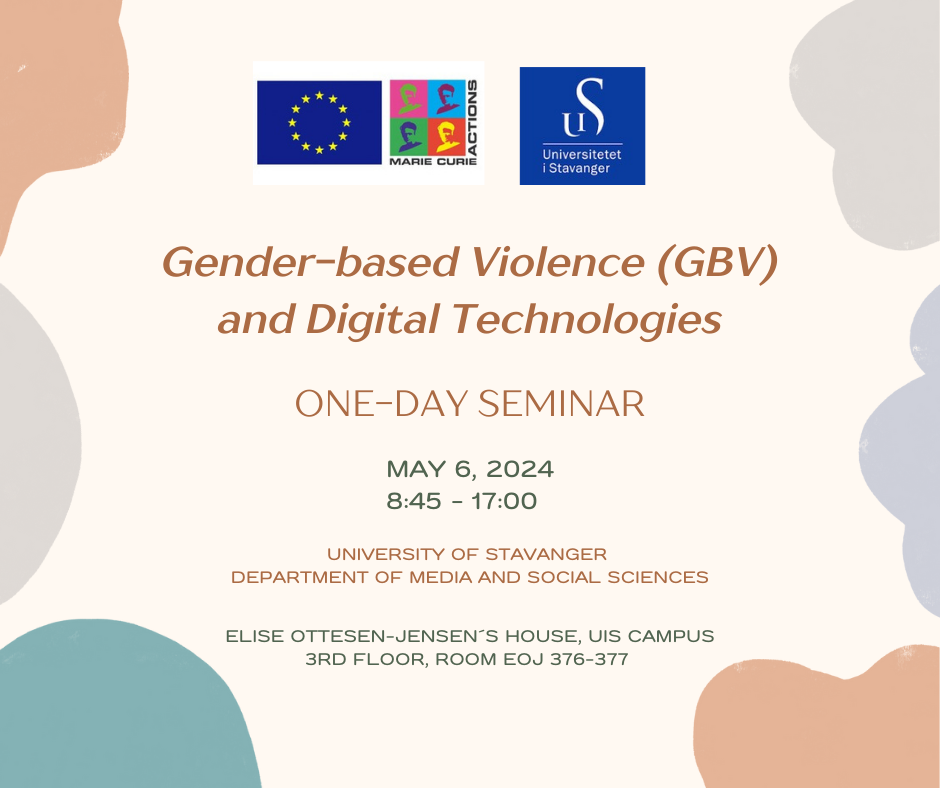Safety and Resilience Through Digital Technologies: A Participatory Study with Women at the Intersection of Gender-Based Violence and Immigration in Norway (SaRe-DiGT) is a Marie Curie research project on the interconnectedness of digital technologies, gender-based violence, and immigration in Norway.
Safety and Resilience Through Digital Technologies
In SaRe-DiGT, we are interested in understanding this impact – the impact of accessing and using digital technologies on individuals´ agency and well-being processes.

The project started in September 2022 and will continue until September 2024. It aims to contribute to the development of research-based knowledge and solutions to create transformative technology-facilitated strategies to combat violence among immigrant communities in Norway and beyond.
Digital technologies, agency, and well-being
The centrality of digital technologies in people´s lives is constantly increasing. We use the internet and technologies for many things – to work, learn, communicate, find friends and partners, shop, create, or have fun. In a way, offline and online spaces are becoming enmeshed in the everyday realities of our lives. Our experiences are shaped by our ongoing minute-by-minute interactions with digital technologies- they shape how we think, feel, and act. Thus, our interactions with them create an inevitable impact on our agency and well-being.
In SaRe-DiGT, we are interested in understanding this impact – the impact of accessing and using digital technologies on individuals´ agency and well-being processes. We first want to understand potentially beneficial aspects of technology use by looking into the ways in which technologies enable, mediate, and/or reinforce individuals´ agency and well-being. In this exploration, we focus on the safe, effective, creative, and transformative use of digital technologies in producing meaningful positive changes in people´s lives.
Alongside these positive aspects, we also seek answers to how digital inequalities and digital forms of violence (violence and harassment mediated and reinforced by the use of digital technologies) can negatively affect people´s well-being and disrupt their agency processes. We want to explore barriers to accessing and using digital technologies and the consequences of experiencing these barriers.
Digital technologies, gender-based violence, and immigration
SaRe-DiGT particularly focuses on the interconnectedness of digital technologies, gender-based violence, and immigration. We want to explore how immigrant women use digital technologies to seek safety from gender-based violence and ensure their well-being. We are also interested in exploring how existing social inequalities immigrant women experience influence their interaction with digital technologies.
Norwegian context as a digitalized welfare state
Norway has a highly digitalized society. We see an increasing trend for digitalization of public service provision in Norway, aiming for better accessibility, availability, and effectiveness of services and supports.
In SaRe-DiGT, by focusing on the experiences of immigrant women in Norway, we aim to examine immigrant women´s perspectives on and experiences of digital services. We want to understand the challenges or barriers they may encounter in adjusting to these new technologies and how these affect their well-being and agency processes.
Busra Yalcinoz-Ucan
Busra Yalcinoz-Ucan is leading the project as a Marie Curie postdoctoral fellow at the Department of Media and Social Sciences, University of Stavanger, Norway.

She was previously a postdoctoral researcher at the Department of Psychology, University of Waterloo, Canada. As a part of this research fellowship supported by Mitacs Accelerate, she worked on a community partnership project examining the availability, accessibility, and effectiveness of psychological interventions and support programs in the gender-based violence sector in Canada.
Yalcinoz-Ucan completed her Ph.D. in 2019 at the Department of Clinical Psychology, Bogazici University, Turkey. Her Ph.D. research focused on women’s decision-making and safety-seeking strategies in violent relationships. Utilizing a feminist intersectionality framework, Yalcinoz-Ucan particularly examined the systemic and structural determinants of women’s decisions, actions, and well-being strategies before and after separation from violent relationships.
She is part of the Gender-Based Violence & Migration (GBV-MIG) Canada Research Program, working as a research associate in the project examining violence against women migrants and refugees. She is also an expert panel member of the Canadian Femicide Observatory for Justice and Accountability (CFOJA).
Hande Eslen-Ziya
Hande Eslen-Ziya is the project supervisor

She is a Professor in Sociology in the Department of Media and Social Sciences at the University of Stavanger. She holds a PhD in Sociology from Polish Academy of Sciences, Warsaw, Poland and an MA in Social Psychology from Bogazici University, Istanbul Turkey. She also has a Gender Specialisation from Central European University, Budapest Hungary.
In 2015, Eslen-Ziya was awarded Associate Professorship in Sociology by the Turkish Higher Education Council. She has an established interest in gender and social inequalities, transnational organizations and social activism, and is currently working on how right-wing populist ideologies by creating alternative troll-science discourses oppose the scientific facts and gender theory.
Margunn Bjørnholt
Margunn Bjørnholt is the secondary supervisor to the project.

She is a Research Professor at the Norwegian Centre for Violence and Traumatic Stress Studies (NKVTS) and a Professor of Sociology at the University of Bergen. She is a professor at the Faculty of Social Studies, VID Specialized University, Oslo.
Her current research focuses on questions of gender, violence and power, including violence against women migrants and refugees, intimate partner violence and violence in Sámi communities. Other major topics of her research have been changes over time and generations in men’s work–family practices and gender relations, and migration and social change.
Podcast
In these two podcast episodes, Busra Yalcinoz-Ucan discusses her research project titled Safety and Resilience through Digital Technologies (SaRe-DiGT).
Yalcinoz-Ucan explains the project objectives and primary findings. This research has received funding from the European Union’s Horizon 2020 research and innovation programme under the Marie Sklodowska-Curie grant agreement No. 101029234.
- Listen to the podcast GBV and Digital Technologies - episode 1
- Listen to the podcast GBV and Digital Technologies - episode 2

Conceptualising TechViolence Nexus: Experiences of ambiguities at the intersection of digital coercive control and (socio)digital inequalities
This short communication is based on a qualitative study investigating the relationship between digital technologies and gender-based violence (GBV).
The term, TechViolence Nexus, introduced in this article, offers an in-depth understanding of the cyclic interaction between digital coercive control and (socio)digital inequalities. It highlights the ambiguities created by technologies in victim-survivors’ lives, revealing the ways in which digital coercive control intensifies and prolongs the reach of perpetrators and excludes women from technological spaces. Our framework calls for a reimagining of technology design and policy implementation that accounts for the impacts of GBV and digital inequalities on women's experiences of technologies.
Here you can find the publication Conceptualising TechViolence Nexus: Experiences of ambiguities at the intersection of digital coercive control and (socio)digital inequalities.

Safety and Resilience Through Digital Technologies: A Participatory Study with Women at the Intersection of Gender-Based Violence and Immigration in Norway.
Busra Yalcinoz-Ucan
2022-2024
You are welcome to contact the project leader Busra-Yalcinoz-Ucan or send an email to the research project group.
This project has received funding from the European Union’s Horizon 2020 research and innovation programme under the Marie Sklodowska-Curie grant agreement No. 101029234.

Event: Gender-based Violence (GBV) and Digital Technologies
This one-day seminar aims to explore the multifaceted and complex interaction between digital technologies and gender-based violence.

This one-day seminar aims to explore the multifaceted and complex interaction between digital technologies and gender-based violence. The seminar starts with keynote presentations from three renowned researchers in the field, each focusing on different aspects of the GBV-technology relationship.
These include technology-facilitated domestic violence from the perspective of children, digital justice and online disclosure in the context of street harassment, and an intersectional socio-digital inequalities perspective on negative online experiences. The afternoon panel begins with a brief introduction to GBV research and services in Norway. This will be followed by a presentation of the primary research findings of a two-year community-based qualitative research project on the inter connectedness of GBV and digital technologies, exploring the patterns and trajectories of technology use in victim-survivors’ lives for safety and well-being. The panel also includes presentations by service providers who work in various GBV services in Norway, through which they will share their observations, experiences, and insights on the service, legal, and policy implications of digital technologies in the GBV field.